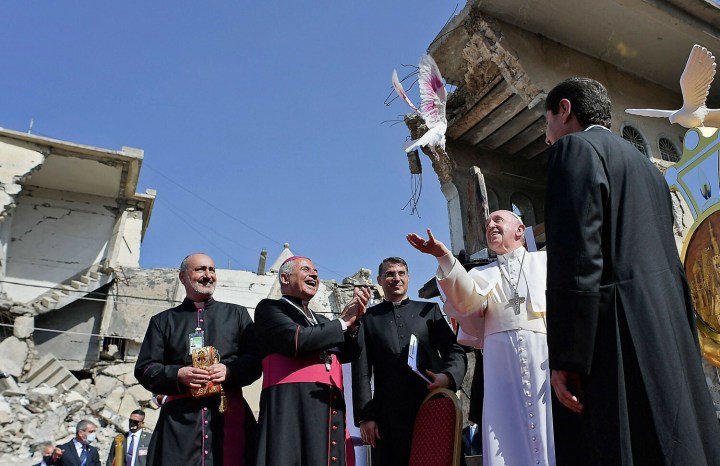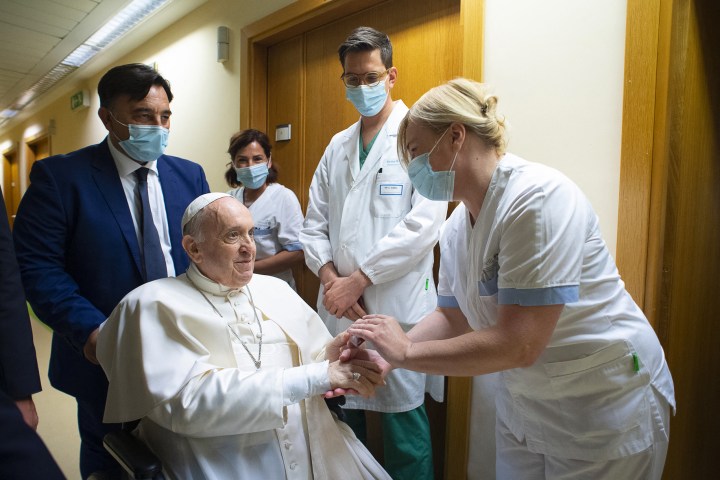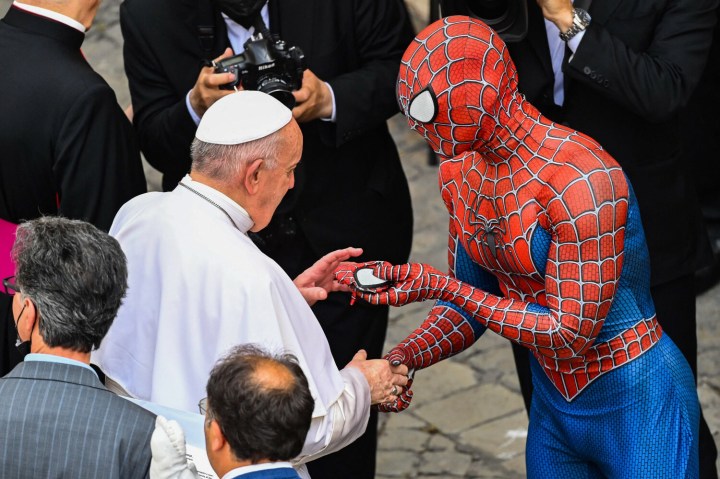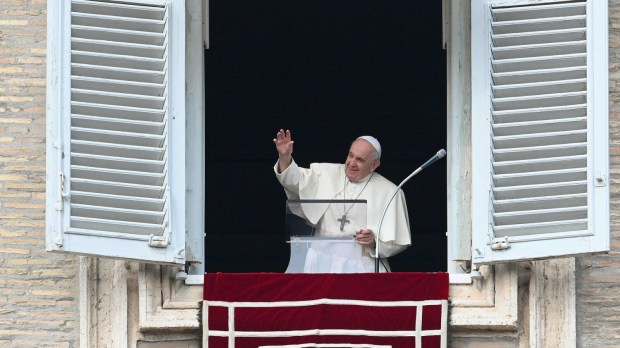New cardinals: 0
For the first year since 2014, Pope Francis did not convene a consistory. Yet the electoral college has reached the symbolic limit of 120 cardinals since the 80th birthday – the date after which a cardinal can no longer participate in a conclave – of Italy’s Angelo Scola on November 7. Set by Paul VI in 1975 as the theoretical maximum limit of the electoral college, this threshold has finally become a minimum in the last twenty years.
It is therefore highly likely that Pope Francis will call a consistory in early 2022 to increase the number of cardinal electors. It should plausibly take place before Lent, which begins this year on March 2. Without a consistory, the electoral college would automatically decrease to 110 cardinals by the end of 2022, with ten cardinals due to celebrate their 80th birthday this year.
Canonization: 1
The pace of canonizations and beatifications has slowed considerably since the start of the pandemic and has not yet picked up in 2021. 2020 had been the first year in 27 years without a canonization: this year, only the Italian Blessed Margherita di Città di Castello (1287-1320) could be proclaimed a saint in an “equipollent” way. A technical term meaning that in some cases – often for very old causes – the pope immediately recognizes the pre-existing cult of the saint and therefore does without a celebration.
However, the long line of “saints in waiting” is expected to shrink in 2022. Indeed, seven Blesseds will be officially canonized on May 15. These include Frenchmen Caesar de Bus and Charles de Foucauld. The other future saints are an Indian and four Italians.

Pope’s trips abroad: 3
After staying in the Vatican in 2020 due to the Covid-19 pandemic, Pope Francis crossed Italian borders three times in 2021, traveling to five countries: Iraq, Hungary, Slovakia, Cyprus and Greece.
Flying to Iraq on March 5, Pope Francis became the first pontiff in history to set foot on that country’s soil. His four-day trip was marked by a meeting with one of the most prominent Shiite authorities, Ayatollah Ali al-Sistani. Six months later, the head of the Catholic Church went to Budapest on September 12 to close the Eucharistic Congress and then to Slovakia from where he left for Rome on September 15. He made a final trip to Cyprus and Greece from December 2 to 6. The trip focused on the issue of migration and relations with the Orthodox.
Appointments of women to important positions: 6
2021 has been the richest year of Francis’ pontificate in terms of appointments of women to high positions in the Vatican. First, he appointed Sister Nathalie Becquart as undersecretary of the Synod of Bishops, giving a woman the opportunity to vote in a synod for the first time. There was also the historic appointment of the first woman secretary of a dicastery of the Roman Curia in the person of Sister Alessandra Smerilli – ad interim, however – in the Dicastery for the Service of Integral Human Development.
In November, the appointment of Sister Raffaella Petrini as Secretary General of the Governorate of Vatican City State in November 2021 made her the first female “number two” in the state administration, a position usually held by a bishop. Other important appointments include Catia Summaria as Promoter of Justice of the Court of Appeal of Vatican City, Sister Nuria Calduch-Benages as Secretary of the Pontifical Biblical Commission and Charlotte Kreuter-Kirchhof as Vice-Coordinator of the Council for the Economy.
Motu proprio: 8
This year, Pope Francis has promulgated 8 Motu Proprio on a variety of topics, ranging from finance to spirituality. According to data from I.MEDIA, the Argentine pope has decreed an average of about 5 Motu Proprio per year since his election in 2013, making him the most prolific pontiff in this area since the beginning of the 20th century.
One of the most important Motu Proprio promulgated by the pope this year was Traditionis Custodes, issued on July 16. In order to ensure the unity of the Church, the pontiff limits the possibility of celebrating in the Extraordinary Form of the Roman Rite – the pre-conciliar form. Another important Motu Proprio is that of April 30, which authorizes the Vatican’s lay justice system to judge cardinals and bishops, opening the door to the trial of Cardinal Angelo Becciu, who is involved in the London building trial that began in July. Finally, Book IV of Canon Law – dealing with punishments – has been rewritten and now takes into account cases of abuse of minors.

Days in hospital: 10
Pope Francis spent 10 days at the Gemelli Polyclinic in Rome for a planned colon operation. Operated on July 4, 2021 because of a symptomatic diverticular stenosis of the colon, he was discharged from the hospital on July 14, after 10 days of convalescence. The operation required general anesthesia and, as the pontiff confided in an interview with a Spanish radio station, consisted of removing “33 centimeters of intestine.”
Although he became the twelfth oldest pope in history this year, the Argentine pontiff has made two trips abroad since his surgery. Argentine doctor and journalist Nelson Castro, who wrote a book on the health of popes, assured that his compatriot was physically very well when they met last October.
Accused: 10
After four years of investigation, the Vatican City Tribunal opened the major trial in July on the London building case, a case involving irregular financial investments made by the Secretariat of State. In all, ten people were summoned by the courts for their alleged involvement in the affair, including Cardinal Angelo Becciu, the pontiff’s former right-hand man at the Secretariat of State. This is the first time a cardinal has been tried by the Vatican’s civil justice system.
The other defendants are members of the Secretariat of State, bankers, and members of the Financial Information Authority, as well as a woman, Cecilia Marogna. So far there have been five hearings, but the trial is still at a procedural stage. In fact, four of the ten defendants have been removed from the proceedings to be questioned by the Promoter of Justice. They could be reinstated in the trial in 2022.
Cardinals who contracted Covid-19: 13
Covid-19 reached a good number of the Church’s high priests in 2021. At least 13 of them caught Covid-19, bringing the number of cardinals with the coronavirus to 22 since the pandemic began.
Of those 13, 11 were cardinal voters. Three have died from the disease, including one elector. They are Brazilian Cardinal Eusebio Oscar Scheid, Venezuelan Cardinal Jorge Urosa Savino and Brazilian Cardinal José Freire Falcao. Throughout the year, Pope Francis has repeatedly supported and encouraged the Covid-19 vaccines, even declaring that getting vaccinated is an “act of love.”

Wednesday Catecheses: 41
This year Pope Francis conducted 41 catecheses during his Wednesday morning general audiences. These audiences have included some surprises: for example, in June 2021, when Spiderman came to meet the pontiff; or in October 2021, when a young disabled boy went on stage to retrieve the zucchetto – the white cap – that the pope wore on his head.
Pope Francis’ catecheses, conducted before thousands of pilgrims at the Vatican or online, focused on several themes: on prayer, a cycle of reflection that began in October 2020 and continued until June 2021; then on the apostle Paul’s Letter to the Galatians, a cycle that ended in November 2021. The Pope then began a cycle on St. Joseph, which is still ongoing.

